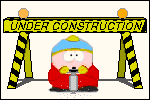
Physics 213
Modern Physics
Spring 2000

Office Hours:
Monday 2:30-4:30pm in 112 NSCIWednesday 2:30-4:30pm in 112 NSCI
Semester schedule (calendar)
Web Projects (under construction)
This syllabus is located at: http://ffden-2.phys.uaf.edu/213.html
Course Syllabus
Prerequisites: Calculus and Physics 211. Algebra, trigonometry and calculus will be used extensively.
Materials Needed:
|
Required Text:s |
Fundamentals of Physics, 5th edition, Halliday,
Resnick, Walker. |
|
Calculators: |
No calculators may be used during exams or quizzes. Otherwise, buy yourself a nice one. A basic, simple scientific calculator with trigonometric, exponential, and logarithmic functions is all that you need. |
Lectures: 1:00pm MWF in . The lectures supplement but do not substitute for the reading. Lectures will cover the major topics, emphasizing and discussing the important points. They are not sessions to regurgitate material already written in the text. Your personal participation is important, and it is critical that you read the assigned material before lecture. Time permitting, several Friday lectures will cover special topics beyond the scope of the text. These will be announced before hand.
Homework: There will be
approximately one homework assignment per week. The assignment will
be given out (and posted on the web and in the hall in front of my
office) on Wednesdays and will be due in on the following Wednesday
by 5:00. Place your homework in the appropriate box in the Physics
Department Office. You are encouraged to work with others on the
homework, but make sure the paper you turn in is not simply copied
from someone else. These assignments help me assess your
understanding of the material, and will count toward your final
grade.
Late problem sets will not be
accepted.
Only a selection of problems will be graded each week, totaling about
25 points each. Solution sets will be posted in the glass cabinet in
the Physics Dept. hall (and on the homework web site if I'm
organized!). You are strongly
encouraged get copies to help you understand how to approach these
problems; it will likely help on tests.
Quizzes: 6 short quizzes will be given in class during the semester. They will be closed book and no calculators allowed (or needed). All difficult formulas needed will be given and the quiz will be similar to some of the recent homework. The quizzes will be announced in class and on the schedule page at least one week in advance.
Project: There will be a project due worth a maximum of approximately 5% of the course grade. The project will be in the form of a web page on a topic in physics that you find interesting and we agree on together. These topics could include biographies of important scientists, scientific projects and scientific ideas. The topic must be agreed to by Feb 18th and must be competed by April. 21st. They will be graded both for presentation and content. More details will be discussed in class.
Labs: There is a lab
associated with this course. ALL
labs and reports must be completed to get a passing grade for the
lab.
A PASSING GRADE IN THE LAB IS NECESSARY TO
PASS THE COURSE.
Questions about the lab should be directed to the teaching assistent
in charge of your lab or Dr. Solie (Rm114) or as a last resort
me.
Hour Exams: Exams will be given during the Friday lecture as follows:
Feb. 11, approx. Chapters 35-37 Haliday and company March 24, approx. Chapters 1-5 Harris
The exams will be closed-book, but you will be given one side of an 8 1/2 x 11-inch sheet with most of the needed equations. No calculators are allowed. The exams will be graded and handed back the following week. Solutions will be discussed and posted.
Final Exam: The final exam will be at 1:00 pm on Wed., May 3. It will cover the entire course (Chapters 35-37 Haliday and 1-? Harris), with some emphasis on the more recent material. You will be allowed one 8 1/2 x 11-inch sheet of notes.
Grading: The course grade will
consist of the following components:
2 hour exams 30 % Final exam 25 % Homework 10 % Quizzes 15 % Project 5 % Lab 15 %
Contacting Me: I have office hours 2:30 - 4:30 Mondays and Wednesday. You can drop by at other times if I'm not busy, or make an appointment. I am never available before class.
Complaints and Concerns: You are always welcome to talk to me about anything, however, if you have a non-subject matter question or concern that cannot be resolved by me contact the department chair, Dr. Watkins, Physics Department Office, room 102 NSCI.
Alternate References: To see
the same topics explained differently, try the following:
Serway; Physics for Scientists & Engineers
General Advice: Physics is not
something you read and memorize, rather it is something you learn how
to do. Try the following study procedure:
NEW
Links to interesting sites:
Relativity animation this is a fly through of a city at regular and relativistic speeds.